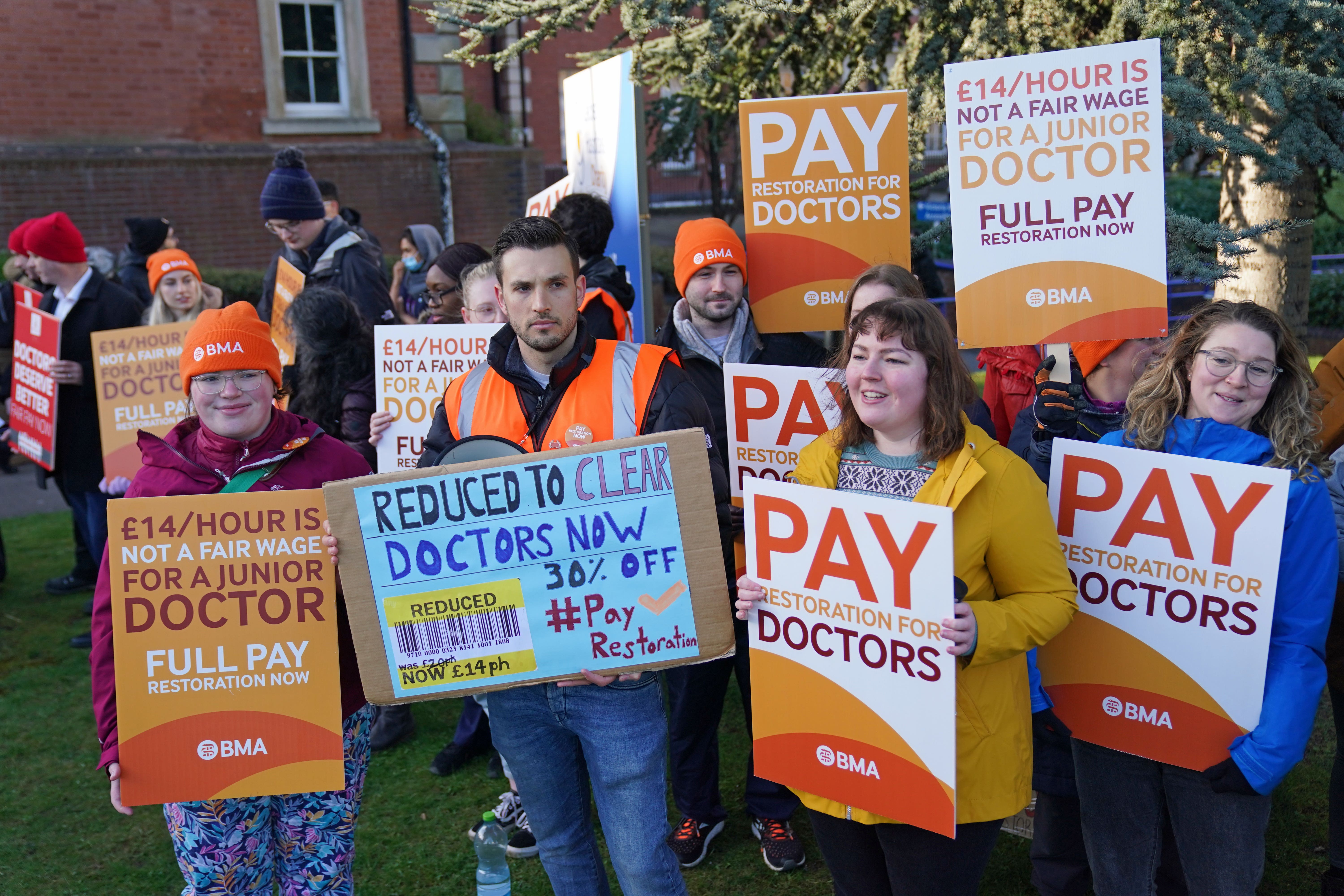Top medic describes ‘loss of trust’ between Government and doctors
It comes as doctors prepare to stage strikes later this month.

The “loss of trust” between doctors and the Government is the worst it has been for at least three decades, a senior medic has said.
Dr Phil Banfield, chairman of council at the British Medical Association (BMA), said that he has never known such a breakdown of trust in his 30 years as a medic.
He said it is an “absolute travesty” that doctors feel they have no other choice than to take strike action.
Later this month, junior doctors are planning to stage the largest walkout in the history of the NHS – a five-day walkout from July 13-18.
It is an absolute travesty that we're in the position where doctors feel that there is no alternative but to take strike action.
And consultants – the most senior doctors in the NHS – are planning to stage industrial action on July 20-21, where they will only provide scaled-back “Christmas day cover”.
Dr Banfield urged ministers to enter talks, saying the Government’s precondition to not get round the table when strikes are planned is a “completely artificial red line”.
He warned that doctors could strike “to the next general election – and beyond” as he called for the Government to enter talks through the conciliation service Acas.
“The loss of trust that has happened between this government and the medical profession I’ve never seen before,” he told the PA news agency.
“We’ve asked for multiple meetings and because of the dispute, they have been declined.
“It’s really sad for the NHS to be in this state.
“It is a complete fallacy that to solve the doctors dispute is unaffordable, it costs more to not fix it than to fix it.
“It is an absolute travesty that we’re in the position where doctors feel that there is no alternative but to take strike action.”
Dr Banfield added: “We signalled a year ago that this was the issue, they have taken an enormously long time to engage and when they have engaged it’s been for the briefest of moments and it hasn’t felt like they have a genuine interest in settling the pay dispute with doctors.”
Asked if consultants would conduct a string of strikes, as seen with junior doctors, he said: “Consultants are taking this one step at a time because the whole point of taking industrial action is to get into the negotiating room to solve the issue and consultants are very keen to do this as are the juniors.
“The juniors have no preconditions.
“The Government has, the Government won’t talk to the BMA during any notified strike action. But that’s a completely artificial red line.”
He added: “It is possible for this government to fix this and it’s possible to do it really before the next industrial action takes place.”
The comments come ahead of the BMA’s main conference – its annual representative meeting – in Liverpool.
Dr Banfield will tell the conference that the Government is “investing in the future of the Australian workforce” as doctors seek work oversees.
He will say the Treasury is “ignoring the workforce crisis as the Australian Government drives billboards to picket lines to advertise a better life for junior doctors.”
Strikes are hugely disruptive for patients and put pressure on other NHS staff, and we continue to call on the BMA to carefully consider the likely impact of any action on patients
Dr Banfield will also tell delegates that the union will be doing more to support whistleblowers and those who are being bullied in the workplace.
“It hasn’t been a good experience for many doctors in the workplace,” he said.
“So, bullying, victimisation, raising concerns and finding that you’re not thanked for doing so – these are ongoing issues that the BMA has been supporting people with.
“It is bizarre that a caring environment and a caring profession ends up not being cared for itself – if no one cares about the carers, you can’t expect them to give good care.
“So part of what I will be speaking about is to say that the BMA will be doing a lot more to support everyone in the workplace as well.”
Asked whether there was a possibility for another system failure like the one witnessed in Mid Staffordshire NHS Foundation trusts where hundreds of patients died as a result of poor care between 2005 and 2009, he said: “The feedback from our members is that a Mid Staffs, you know, it’s quite possible still within the existing system, and you’ll have your own reports of different hospitals and trusts at different times, that are very nearly on the cusp of being a Mid Staffs-like organisation.”
A Department of Health and Social Care spokesman said: “We hugely value the work of junior doctors and NHS consultants.
“We’ve been engaging with both the BMA Junior Doctors Committee and BMA Consultants Committee on their concerns and it is disappointing that BMA members have voted for strike action.
“We stand ready to open talks again – we urge them to come to the negotiating table rather than proceeding with their proposed strike dates.
“Strikes are hugely disruptive for patients and put pressure on other NHS staff, and we continue to call on the BMA to carefully consider the likely impact of any action on patients.”
Bookmark popover
Removed from bookmarks